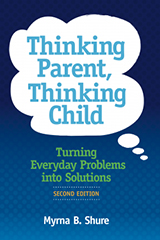Parenting Tips On The Air
Please see the tips below and then rate them by clicking on the Was this tip helpful?
These tips aired on The Big Talker -- WPHT 1210 AM Radio (serving parts of PA; NJ; DE).
Funded by the Clayman Family Foundation, whose mission is to promote efforts to reduce and prevent mental health disorders.
1. Kids Who Bully
Do kids who hurt others feel the pain of their victims? Do they even care about themselves?
Once I asked a 4-year-old what happened when he hit a child to get a toy. He said, “He hit me, but I don’t care.”
Maybe he really did care but couldn’t think of other ways to satisfy his needs.
Do children who hurt others think about feelings at all?
Are they so used to getting hurt themselves that they become immune to what happens to them? And to others?
Perhaps children who say, “I don’t care,” should make us take special pause.
Kids who can solve problems important to them now will be thinking, feeling human beings who will be able to solve problems important to them later.
Listen to tip (press arrow to play):
also available as mp3
2. Do I Listen to my Child
What do you do when your child misbehaves? Do you lash out? Or do you let her tell you what she’s thinking and feeling now?
Tim, age 4, tore up his father’s cigarettes and threw them in the trash. Dad was ready to spank him, and yell, “Never do that again!” But instead, he calmly asked him why he did that.
“Big Bird said, ‘If we love someone who smokes, tell them to stop ‘cause they’ll die.’
Daddy, I love you and I don’t want you to die.”
Tim’s dad was so touched by that he said, “Son, I’ll never smoke another cigarette again.”
He didn’t.
If we want our children to listen to us, we must first listen to them.
Imagine how Tim might have felt inside had his dad not listened to him?
Imagine.
Listen to tip (press arrow to play):
also available as mp3
3. Life's Frustrations and Disappointments
How do you feel when something you want to happen, doesn’t?
How do you feel when something you thought would happen, didn’t?
Do you fly off the handle, feel frustrated, or sad?
Do you take it out on others, give, up, or find a way to make it ok?
We all have frustrations and disappointment in life. And children do too.
Here’s how we can help:
• Let them express their feelings so they don’t bottle them up.
• Help them think of something different to do that they can feel good about.
• Help them appreciate what they do have, instead of what they do not.
A l0-year-old was disappointed that her parents couldn’t come to her first soccer game. She said, “I look at the bright side. I’m lucky. Some kids don‘t get to do this at all.”
Sometimes we can learn from our kids. Now when I feel disappointed about something, I think about what I have, and try to enjoy it more.
Listen to tip (press arrow to play):
also available as mp3
4. Mommy, Tommy Hit Me.
Has your child ever whined, “Mommy, Tommy hit me?”
Some parents tell their child to hit back. Others, “Don’t hit back, tell the teacher.”
One parent is telling her child what to do, the other what not to do.
Different advice—same approach. Both are doing the thinking for the child.
Instead, ask:
“What happened before he hit you?”
“How did you feel when Tommy did that?”
“Can you think of what you can do next time that happens?”
Kids are more likely to carry out their own ideas than ones suggested, even explained by us.
One day, Robert came home beaming, “Mommy, I solved a problem today. Michael kicked me and I told him I won’t be his friend. Then we played cowboys.”
Robert’s problem was solved. Robert – is four years old.
Listen to tip (press arrow to play):
also available as mp3
5. Boys Have Feelings Too
Do your boys tell you how they feel about things as much as your girls? Research shows that maybe they don’t. Does it matter? Boys who believe they might be called a “sissy” if they talk about this may really feel anxious and sad inside, feelings they may hide. Boys do want to talk about what makes them proud, sad, frustrated, afraid – just as much as girls.
· Talk to your sons as well as your daughters about feelings, even if they appear to shut down. Let them know you’re there when they do want to talk – and then listen – really listen.
· Talk about good as well as not-so-good feelings.
· Help your child think about possible mixed emotions about something – and focus on the positive side to help relieve the stress.
Everyone likes to talk about how they feel.
Your kids do too. Let them.
Listen to tip (press arrow to play):
also available as mp3
6. Peer Pressures at School
Is peer pressure to smoke, try drugs, or drink alcohol a problem now? How can you know?
Look for signs of stress, less enthusiasm for school, even a drop in grades.
Avoid lecturing or telling your child what to do. Ask questions to help her think about what she’s doing.
- What are your hopes and dreams?
- What might happen to your hopes and dreams if you smoke cigarettes, or try drugs?
- How will you feel about that?
- Can you think of something you can do or say so those things won’t happen?
Help your child make good decisions and he’ll develop an inner strength, and less need to succumb to the pressures of doing what he doesn’t want to do, from “friends” he really doesn’t want to have.
If we change the way we talk to kids, it will change the way they talk to us – and to the peers who are pressuring them at school.
Listen to tip (press arrow to play):
also available as mp3
#7: Is Your Child Mercilessly Teased?
Is your child having problems in school? Is something on his mind?
You can help your child talk about his thoughts and feelings. Ask:
What happened in school today that made you happy?
How about mad, or sad?
How can you help yourself feel better?
One 10-year-old told me, “I can’t concentrate on my schoolwork when kids call me “retard,” and “four eyes.” She thought about what she could do to solve the problem, then wrote a letter telling the kids how she felt about what they were doing.
This girl took control. She did not give up. She told them how she thinks and feels about being teased. Her classmates gained new respect for her.
Some children who are failing at math don’t necessarily need more math. They need to relieve the stress that’s preventing them from focusing on the math they’re getting.
We must give our kids the skills to do that.
Listen to tip (press arrow to play):
also available as mp3
#8. Want Teens to Talk? Listen!
Do you worry your child might get in with the wrong crowd?
Start to smoke? Even try drugs?
You could ground her if she steps out of bounds – but she may do what she wants – when you’re not looking.
You could ask where she’s going, and with whom?
But she may think you’re intruding on her privacy. And would you
know if she’s really telling the truth?
Research shows that teens who feel it’s safe to tell their parents what they do are less likely to engage in risky behaviors.
First, listen – really listen—to what your child says. Then ask:
“What might happen next?”.
Do you want that to happen? If not, ask if she can think of something else she can do so she won’t feel that way.
Even better, start this before the teen years.
Help you kids feel safe to talk about things important to them now, and they’ll likely feel safe to talk about things important to them later.
Listen to tip (press arrow to play):
also available as mp3
#9. What Makes Uncommunicative Teens Want to Talk
Your child ‘s a teenager now. Does he want to talk? One mom said, “If I ask him questions, all I get is, ‘Nothin.’ ‘No one.’ ‘Dunno.’”
But what makes them want to talk?
Tom’s mom talks to him about his interests—sports figures, pop artists. When a well-known pop artist got into trouble over alleged inappropriate behavior with girls, Tom started talking about his feelings about girls. When another died from an overdose of drugs, Tom talked about the dangers of drugs.
Bill, l7 thought all his parents cared about were his grades, “Not what I cared about. It’s hard to confide in them how I feel about things.
If you talk with your teen about what interests them – without “What did you do?” “Who were you with?” and “Why did you do that?” -- you might be less likely to hear “Nothin,” “No one” and “Dunno.”
Listen to tip (press arrow to play):
also available as mp3


